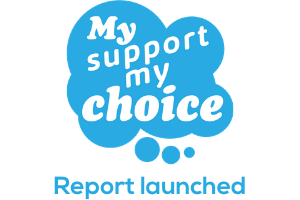Experiences of SDS in South Lanarkshire
Self Directed Support Scotland (SDSS) and the Health and Social Care Alliance Scotland (the ALLIANCE) have published a report exploring the experiences of people who access or wish to access Self-directed Support (SDS) in South Lanarkshire.
This report is part of a suite of Local Authority reports collated during the largest direct consultation of SDS to date – My Support, My Choice: User Experiences of Self-directed Support in Scotland (MSMC). The research also resulted in a separate suite of thematic reports exploring the experiences of people with learning disabilities, Black and minority ethnic people, people with lived experience of mental health problems, blind and partially sighted people, and women as users of SDS.
The national report and the five thematic reports have been quoted in the Independent Review of Adult Social Care, and provided key evidence for Social Work Scotland’s trialling of the new Self-directed Support (SDS) Standards.
My Support My Choice: People’s Experiences of Self-directed Support and Social Care in South Lanarkshire highlights evidence of good practice and where improvements can be made. We hope it can assist in the strategic planning and delivery of future SDS/ social care in South Lanarkshire – particularly regarding the development and local implementation of the National Care Service.
People in South Lanarkshire generally reported that SDS had improved their social care experience and have shared examples of good practice from across the region, particularly about good conversations and relationships with social work professionals, and involvement in care decisions. However, as the research highlights, there are key areas where improvements could be made to respond to people’s concerns and increase the effectiveness and reach of positive SDS experiences.
The views expressed by research participants and analysis of the findings have led to a number of recommendations, many of which echo other independent reviews of SDS:
- People need good access to publicly available, high quality information about SDS/ social care, in a range of accessible and tailored formats.
- Sufficient time must be allocated for needs assessments and review meetings, to allow for detailed questions and consideration of the four SDS options.
- Further information and training for professionals may be required about the SDS options and supported decision making.
- Local authorities and health and social care partnerships should work with people who access SDS and unpaid carers to improve systems and processes related to care staff recruitment, training and quality, including diversification of the workforce.
- Local peer networks should be encouraged and supported.
The report also includes a response from South Lanarkshire Health and Social Care Partnership (SLHCP), who said:
“SLHCP and its principal partners South Lanarkshire Council and NHS Lanarkshire acknowledge the experience of people accessing support and the individual journeys and experiences that have been recorded. We have worked hard with our national and local partners to ensure good outcomes for the people of South Lanarkshire.”
The research team are organising an online feedback session with key stakeholders from South Lanarkshire on Monday 18 October from 11am – 1pm. All welcome!
Please register for the free session and join the conversation as we explore the delivery of SDS at every stage of the process, from first contact, to assessment, establishing eligibility, allocating resources, support planning and reviews.
The input of those living and/or working in South Lanarkshire is very valuable in discussing next steps.
If you have any questions about the research, please email Dr Hannah Tweed, Senior Policy Officer at the ALLIANCE (hannah.tweed@alliance-scotland.org.uk) or Mark Han-Johnson, Membership Development Executive at SDSS (mark@sdsscotland.org.uk).



